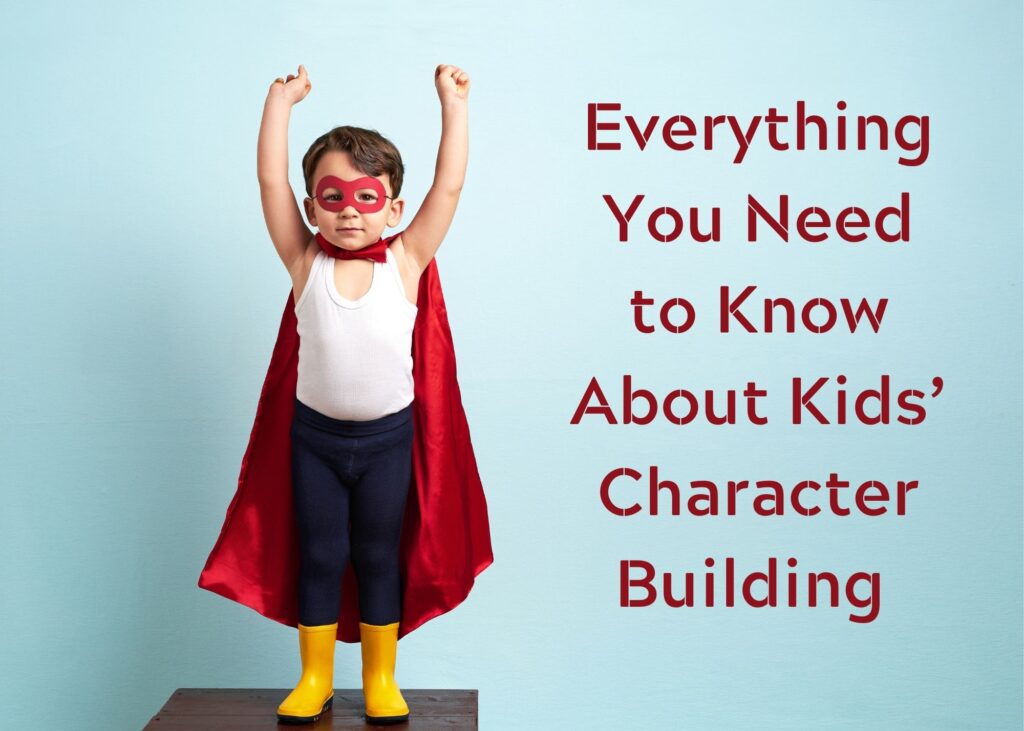Everything You Need to Know About Kids’ Character Building
 Nine out of ten parents believe that positive character traits are more important than academic performance. Almost half of the respondents say they don’t know when and how to start character-building.
Nine out of ten parents believe that positive character traits are more important than academic performance. Almost half of the respondents say they don’t know when and how to start character-building.
This data from Primrose Schools network`s survey shows that parents believe that it’s vital to nurture values but fail to answer what exactly builds character. Today we`ll talk about it, beginning with the general concept of a character in kids and ending with character-building exercises.
Character Development for Kids
Character is the way one behaves oneself based on internal beliefs and value systems. To some extent, we can call it a style of behavior.
Interestingly, the character isn’t a fully innate quality, but a choice to be someone formed under the influence of other people, life circumstances, experiences, etc. Therefore, character formation is influenced by many external factors and the very process takes place in early childhood, up to 10 years old.
In fact, it`ll not remain the same during one`s life, but the outlines occur in childhood. Parents can significantly influence the character development for their kids’ goodness. It means imposing them with good traits. VIA Institute on Character defines 24 virtues as the basis for good character. These are such traits as:
- Appreciation of beauty;
- Bravery;
- Gratitude;
- Honesty;
- Humility;
- Fairness and other ones.
Benefits Of Good Character
What builds character is lots of effort and time. Parents should be patient and develop the same trait in their children. By the way, you should focus more on choosing the right kindergarten and meeting the people your kid can benefit from.
Interestingly, strong character can help a person to be mentally healthy and happy despite anything. Also, it improves:
- Personal relationship;
- Career opportunities
- Being able to focus;
- Ability to deal with stress and challenges;
- Health condition;
- The ability to make decisions fast;
- The sense of contentment, etc.
How to Develop Good Character in Your Kid?
Children develop their character gradually. As long as their intellectual and physical ability improves while growing up, they can absorb new behavior models, which become leading in adulthood. Toddlers and infants cannot be taught virtues due to their young age ,so parents should take it into account and act accordingly. Appropriate questions about your child’s personality could help you know your child better.
Mind, that leaving your kids on their own never builds a strong character.
Infants
The main aim is to build a relationship with your little one giving him a sense of security and love. Kids aged 18 months cannot recognize what values are. Telling them about honesty or love is nonsense. Instead, you should meet their needs – hunger, comfort, and safety to make them trust you. Make sure your child is feeling secure while touching him, cuddling, or just holding him. That will be your first step in an attempt to make his inner world even more beautiful through character development lessons that can be applied later.
Toddlers
When being toddlers, kids can already recognize that they share the environment with other people and there`re some rules and limitations. Still, most of them pretend to demand things from others and refuse to borrow something (toy, for example). It’s an opportunity to teach them the first lessons with the help of character-building games. Use different group activities to make it happen.
Besides, toddlers fail to control their emotions. It means that parents should be prepared to handle it calmly. By the way, temper tantrums are a chance to teach kids patience and self-control skills.

Kindergarteners
At this age, children can make up stories or exaggerate events. That’s quite normal but you can use a character-building activity that focuses on honesty. Moreover, if you provide a rational response and accept the truth, whatever it is, kids will feel secure to tell you the truth in the future.
One more lesson you can provide them is generosity. Sharing personal belongings is very difficult for children. But parents can choose the best character-building games to practice giving away.
Finally, teach your kids about self-organization, which is useful skills.
Character Building Activities for Children
A day for compliments.
Make a day once a week to compliment each other. Let children write a compliment on a piece of paper and hand it over to one another.
Paying random people compliments is a great kindness exercise.
Learn to compliment people regardless of their being different in any way.
Complimenting your kids can be a great way to deal with kids’ negative self-talk.
Being polite for 24 hours will be a great challenge to start building your kids character.
Time-sharing activities.
Give kids a toy and explain that each of them can play with it only for certain periods, taking turns. When the buzzer goes off, a kid should give the toy to the child next to him.
Teach them responsibility by assigning tasks. For example, to collect papers on the table. If you let him do it without your supervision, it can also benefit the child’s self-confidence.
Time-sharing activities also help develop flexible thinking skills.
True or false.
Teach a kid to be honest by providing examples. Tell him some statements and ask him to identify whether it’s true or not. The statements should be clear to not confuse kids, such as “your table is upstairs”.
Puppet role play.
Model some conflict situations by role-playing and give a child a chance to resolve them. If he doesn’t know, demonstrate it to him on the example of puppets.
Gratitude tree.
Make a tree to leave a leaf on it each time a kid feels grateful.
Recipe of good character.
- Ask kids to write down the “ingredients” of good character. Each student comes up with one idea. Then discuss each trait justifying the choice.
- Read or listen to stories that develop virtues. Then discuss with kids what are the virtues and how they can help the protagonist in his life.
- Talk about respect on the example of insects by watching and not disturbing them.
- Develop kindness by teaching kids to take care of pets including the homeless ones. Buy food for them and feed animals that need it.
- Encourage children to develop courage by letting them fulfill difficult tasks. Yet, be sure it’s safe and cannot bring too much damage in case a kid fails.
Play a shop game.
Ask your little one to arrange a grocery store and evaluate all the goods. Parents should play the role of buyers using real money. Thus, your kid will learn how to use money and also what the prices are nowadays.
Tips for Character Building
- Be an example for your little one. He looks up to you.
- Don’t criticize him for making mistakes.
- Let him make his own choices and take responsibility for it.
- Call him the word you want him to be. That means if you want to raise a leader, tell a kid that he`s a leader. If you tell him that he’s a loser, he’ll be a loser.
- Don’t allow a kid to play computer games for long or surf the net without the need. It may create internet addiction.
- Create an environment to gain new experience. Sometimes it can be difficult for parents not to help their little one, but you should give him a chance to explore the world himself. It’s OK if he fails when learning to ride a bike or is worried about being left alone with other people (not his parents).
- Expand his horizon. It can be everything – trips, crafts for building character, new acquaintances, and hobbies. Each situation is a chance to gain new knowledge and experience that influence character development.
- Be fair. If you demonstrate unconditional love only to one of the siblings the other may grow up being offended.
- Don’t impose your viewpoint. You can give advice but it’s up to your kid to decide. Of course, the scale of the decision depends on his age. But a toddler can always choose the color of his clothing or the child’s book he wants to receive.
- Make your little one stick to the rules. It can be boring and uptight, but it develops self-discipline so needed in adult life.
- Don’t interrupt your kid`s conversation with other children. Let him develop social skills on his own.
Final Word
Character building continues the whole life, but the first years are the most important because they set the direction. Therefore, parents ought to be kind and patient to cope with all challenges and let the kid form his own personality. It`ll pay off in the future when your little one will become a successful and happy adult.
More articles

Teaching Kids to Celebrate Differences Through Books
Why Books Matter in Teaching Kids About Differences Teaching kids to celebrate differences through books is one of the most effective and natural ways to build a more inclusive future. Stories have long served as windows into other lives, cultures, and perspectives. When children read books that highlight diversity, inclusion, and empathy, they begin to […]

How Technology Can Empower Your Kids to Learn, Grow, and Thrive
Technology often gets a bad rap when it comes to its effects on children, including issues related to screen time, cyberbullying, and online distractions. While these concerns are valid, these misconceptions should not overshadow its incredible potential to enhance education, creativity and well-being for your child when used responsibly and mindfully. When used appropriately, technology […]

Using Alicia Ortego’s Books in the Classroom: Tips and Examples
In today’s classrooms and after-school programs across America, teachers and educators are constantly looking for effective ways to support children’s social-emotional learning (SEL). Alicia Ortego’s My Superpower books have become a favorite tool for many educators to encourage kindness, mindfulness, confidence, and other important values in young learners. Here are some real-world-inspired ways teachers and […]



